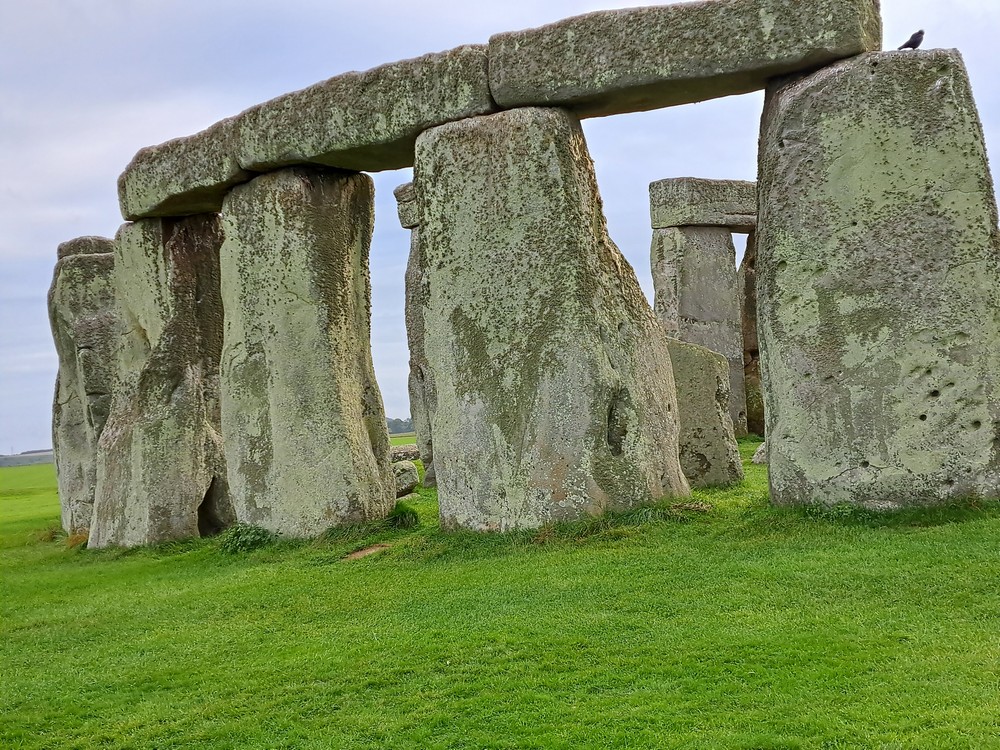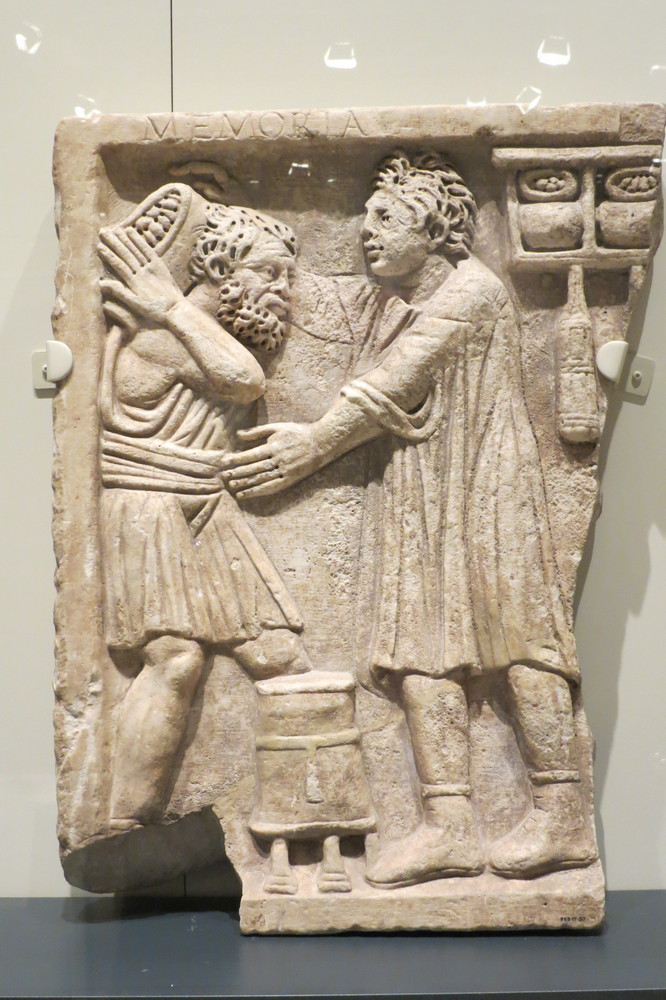RS31: Jesus and the Book of Job
A: We’ve been talking a lot about your teachings on life and death, healing and miracles. Tell me why John the Baptist tried to kill you.* It seems a strange thing for a religious prophet to do.

“Have you not read this scripture: ‘The stone that the builders rejected has become the cornerstone; this was the Lord’s doing, and it is amazing in our eyes’?” (Mark 12: 10-11). I was fortunate to be able to visit Stonehenge and walk among the stones with a small group of people from all around the world. Only a few tour groups each year afford this opportunity. Despite the immensity of the stones and the complexity of the construction, there remains a sense that you can connect simply and directly with the Divine. Whoever designed this site had an abiding desire to create a home for the Soul — a non-hierarchical place that uses ancient stone to express the nested layers of our relationship with God. It’s this kind of relationship that the author of the Book of Job tried to convey through his anti-wisdom wisdom. Photo credit JAT 2023.
J: John didn’t act on his own. It would be fair to say that my brother James and my former friend Peter used John. As we’ve discussed, John was suffering from major mental illness — schizophrenia combined with narcissism. If you played on his paranoia and narcissism, you could get him to do your dirty work for you. This is what James and Peter did. They used John to try to get rid of me.
A: You describe Peter as your former friend.
J: There’s a reason the Gospel of Mark portrays Peter in such an unflattering light in the final chapters of his book (Mark 14). Mark 14 should be subtitled, “The Truth About Peter That Peter Doesn’t Want You to Know.”
A: Peter comes across as a coward and a liar and a collaborator, a man who sits with the high priest’s guards and warms himself by their fire.
J: Yes. “Warming himself at the fire” is an ancient idiom for “saving himself by selling out to the enemy.”
A: Peter doesn’t seem like the kind of man you or any sane leader would entrust with the job of carrying on your teachings.
J: Peter was a fickle, vain, posturing man — a lot like Wormtongue in Tolkien’s The Two Towers — and he only gained a position of authority in the Kingdom movement after I died and he could spread insistent lies about his “humility” and his “chosenness.”
People wonder why Mark shows me rebuking Peter with a remark about Satan. But it’s not a supernatural claim about Peter. It’s a psychological claim.
A: Mark 8: 31-33 says, “Then he began to teach them that the Son of Man must undergo great suffering, and be rejected by the elders, the chief priests, and the scribes, and be killed, and after three days rise again. He said all this quite openly. And Peter took him aside and began to rebuke him. But turning and looking at his disciples, he rebuked Peter and said, ‘Get behind me, Satan! For you are setting your mind not on divine things but on human things'” (NRSV translation).
J (nodding): Mark is telling his audience that Peter, who later claimed to be a faithful and devoted apostle, was, in fact, “the adversary” — like the adversary named Satan who tried to ruin Job’s life with his incessant legalistic wrangling, his incessant lack of faith in the mystery of love, his incessant rejection of God’s right to choose how he (they) will intervene in the world.
Later Christians have read the reference to Satan as a supernatural claim for the Devil. But in the book of Job, Satan isn’t the Devil. He’s the wily Materialist who sits on God’s council of heavenly advisers and insists that the man named Job is devoted to God only because he has many blessings — healthy sons and daughters, great herds of livestock, and many servants. Take away those blessings, says ha-Satan (the Accuser), and Job will curse God instead of loving him. It’s simple Cause and Effect.
But this isn’t what happens. Job tries and tries to understand the Law of Cause and Effect and invoke it for his own benefit, but his efforts fail. God — not the man named Job, and not the Materialist philosopher ha-Satan — gets the final say. In the end he chooses to restore Job’s blessings, but only because he chooses to, not because he’s been forced to by clever and lawyerly invocations of Law.
I had a lot of respect for the Book of Job. I didn’t understand it at all when I began my journey of faith. I understood it completely by the time I died. God doesn’t promise anyone an easy or pain-free journey. Faith has no foundation at all if it’s built on the premise that you’ll escape all pain by following the Law. Faith requires humbleness. Faith requires respect for all life in Creation, including behemoths and leviathans and — God forbid! — daughters who are named and given land alongside their brothers upon their father’s death.
Some commentators think God is pummelling Job at the end with reminders about God’s power. They think God requires Job’s submission to this power. But the speeches by God at the end of the Book of Job aren’t about power. They’re about humbleness. Humbleness as God and God’s angels understand it, not as religious leaders have taught it.
A: Humbleness as an intense awareness of who you are and who somebody else is. Knowing your strengths, and being proud to use your strengths in service to others, but also knowing your limits. Knowing who you’re not as much as knowing who you are.
J: Yes. This point is drilled home in Chapter 40 (verses 1 to 8):
And the Lord said to Job: “Shall a faultfinder contend with the Almighty? Anyone who argues with God must respond.” Then Job answered the Lord: “See, I am of small account; what shall I answer you? I lay my hand on my mouth. I have spoken once, and I will not answer; twice, but will proceed no further.” Then the Lord answered Job out of the whirlwind: “Gird up your loins like a man; I will question you, and you declare to me. Will you even put me in the wrong? Will you condemn me that you may be justified?” [emphasis added]A: “Who is this that darkens counsel by words without knowledge,” God says to Job in 38:2. The rejection of “words without knowledge” is very strong in your original teachings. Also the refusal to blame God for the mistakes made by narcissistic human beings.
J: A human being who believes he/she can control the Law of Cause and Effect is not a person of humbleness or faith. Job had to go through a lot of suffering to get this point through his thick head. But eventually he got it. Just as I eventually got it.
A: So I’m thinkin’ Peter never got it.
J: Bottom line, you can’t be in relationship with God if you think you are God, if you think you’re so wonderful and special that the very laws of Creation will bow down to your wishes.
It. Ain’t. Gonna. Happen.

Another site where ancient stones are saturated with the enduring mystery of God’s immense Creation is Peggy’s Cove, Nova Scotia, Canada. Although the harbour is famous for its red and white lighthouse, I was drawn to this patch of rock where hundreds of visitors from all over the world have built their own versions of inuksuit — the stone landmarks or cairns constructed by indigenous peoples of the North American Arctic. Like the lives of human beings, the small inuksuit are transient, while the enduring rocks beneath remind us of God’s steadfast plan for all life in the universe. Photo credit JAT 2025.
A: Would it be too much of a stretch to say the Book of Job is an anti-narcissism diatribe?
J: No, it’s not too much of a stretch. ob’s four interlocutors — Eliphaz the Temanite, Bildad the Shuhite, Zophar the Naamathite, and Elihu son of Barachel — are brilliantly drawn “portraits” or “archetypes” for brain patterns that would be described today in psychiatric terms as DSM-IV disorders. Just because ancient writers and teachers didn’t have a DSM-IV doesn’t mean they couldn’t see these patterns of behaviour through careful observation.
A: I see a PhD dissertation for somebody in that remark.
J: The important thing to bear in mind is that a person like Peter, who is narcissistic and convinced of his “right to be right,” will always, of necessity, be a coward. He has to be a coward, because only a coward won’t admit his own mistakes. The refusal to admit one’s own mistakes (especially to oneself) is a hallmark of narcissism.
A: It takes guts to be honest about your own mistakes. That’s one thing I learned the hard way.
J: Me, too, in my time.
A: Yet it’s deeply healing to be honest about one’s own mistakes.
J: It is. This is part of the reason for the great success of the Twelve Step method — you have to let go of your denial and be honest about the harmful choices you’ve made in the past.
A: But if another person tries to confront the denial, they can put themselves in harm’s way. You’ve talked in the past about your brother’s narcissistic rage reaction. I’ve been on the receiving end of similar rage reactions — most recently from one of the owners of the business where I work — and these rage reactions . . . they sure aren’t pretty. They’re violent in a way that’s hard to describe.
J: We talked a few days ago about the way in which a status addict tries to acquire status points by stealing part of another person’s inner self-image (Father of Lights and Mother of Breath — Again). Narcissists are always status addicts, so this “stealing mechanism” is an important part of their psychological profile. Narcissists are always trying to build themselves up by tearing other people down. It gives them a sense of power. Unfortunately, if you dare challenge the myth of their “rightful” power, they’ll go berserk. Literally berserk. Blood lust comes over them. A temporary form of insanity. If swords (or guns) are handy, they’ll use them. If iron swords aren’t handy, they’ll use whatever they can find to try to annihilate you, to rob you of your entire being so you’ll disappear into a cloud of nothingness. They’ll try with all their might to reach into your core self and rip out your heart so they can eat it and claim your power.
A: Yuck. Gross. It’s like that gross heart-eating scene from Indiana Jones and the Temple of Doom. But, you know, come to think of it, it’s exactly what my boss tried to do to me in January. She did her best to annihilate me. Didn’t work, though, because I forgave her for her brutal attack. I’m still there, and I’m still looking her in the eye.
She hates that. She hates it when I look her in the eye.
J: She knows at a deep narcissistic level that she has no power over you. This frightens her. It undermines the lies she tells herself. Your very presence reminds her she isn’t the nice person she claims to be. So she hates you. She has to hate you and she has to blame everything on you and the co-workers who stood up for you because otherwise she’d have to look at herself in the mirror and admit her own mistakes. She’s not going to do that. Not while she’s arranged her whole world to protect herself from the truth about her own motives. She thinks she’s safer this way, but she’s not. She thinks if she can “get rid of” the people who witnessed her narcissistic rage reaction in January (by forcing them to quit), all will be right with the world, and she can return to her merry little narcissistic belief that she’s the most wonderful boss there could ever be.
Her guardian angels have other ideas. For more details, please refer to the Book of Job, which could also be titled, “You’re Not Going to Want to Hear This, but God Has an Opinion on Your Narcissism.”
* Please see the February 6, 2011 Jesus Redux post John the Baptist and Jesus and the May 15, 2011 post John, Paul, and James: The Lunatic, the Liar, and the Lord.















